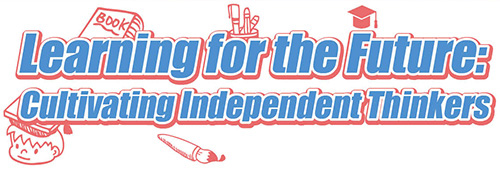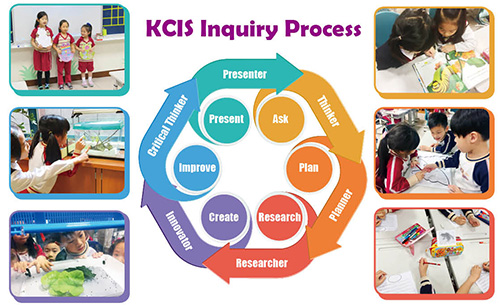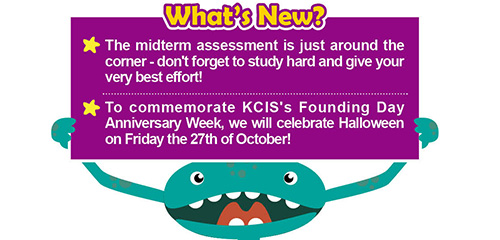
Happy Birthday, KCIS
國際處主任 賴國宜
一向以教育制度領先全球的芬蘭,在2016年推出新的中小學課綱,導入「主題式學習」,強調培養孩子跨領域的橫向能力。康橋的英文課,實施「專題課程」(Reading Project)已多年,以主題探究的方式,讓學生運用跨領域的知識,探索真實世界的各種現象,思考因應解決的辦法,從中學習創新、合作、表達等重要的能力,這一期Kang Chiao Spotlight邀請國際處課研組長Jason Harmon,以「為未來學習」(Learning for the Future )為題,詳細說明英語專題的課程設計理念和學習模式。
二年級中籍英師,Ms. Roxanne帶我們一窺「讀寫合一」的英語寫作課程(Writing Assignment),從開學第一天到第179天,教室裡的人、事、物產生什麼變化,孩子們以自己的學習經驗,為這些事物的改變,編寫生動的故事,我們特別精選幾篇作品與大家分享。
英語小記者社是高年級最熱門的社團之一,這群熱衷英文寫作的孩子,定期為大家報導校園活動,他們將以Muggles News專欄,來分享最精彩的校園新聞。
光輝十月是個忙碌的季節,有許多重要的節慶,其中最令孩子們期待的就是Halloween (萬聖節),除了搗蛋要糖(Treat or Trick),還有哪些有趣的事情呢?快來讀Fun Facts for Halloween。十月還有一個最重要的節日,就是康橋校慶,學校安排一連串的活動,歡迎大家一起來熱鬧慶祝 康橋生日快樂。
Kang Chiao has been implementing theme-based project learning for many years. Our Curriculum Coordinator, Jason Harmon, elaborates how teachers design projects that follow inquiry stages. Through these stages, students develop critical thinking and problem solving skills. Ms. Lucy presents to us the grade 2 writing assignment, extending from the reading, The 1st Day of School and The 179th Day of School, and with fertile imaginations, students write a narrative about their stories at school.
October is always a busy month with holidays, and the most important events are the celebrations surrounding our school’s Foundation Day. There are many games, activities and sports competitions that complete our school-wide celebration. One of the highlights is the Halloween Party hosted by the International Department. We are looking forward to seeing all the brave children in the Haunted House!

~ Jason Harmon
Curriculum Coordinator, International Department
We live in a rapidly changing world, more interdependent than ever. This makes the way we raise and nurture our children complex. We want to teach the next generation based on the way we learned, but tools that were once necessary for success no longer apply. Critical thinking skills that are used to know how and why to find information are of much greater significance. In a way, answers reveal themselves. Knowing how to ask the right questions and understanding problems creates paths to answers.
Kang Chiao prepares our students for the future through student-based inquiry and theme-based projects. Put simply, it’s not about what teachers cover; it’s about what students discover. Teachers design projects that follow the inquiry stages of ask, plan, research, create, improve, and present. These stages are written in student-based language that allows teachers to focus on the twenty-first century skills they want students to develop. Following an inquiry-based project model develops critical thinking and problem solving skills in students. Students explore their own areas of interest within a larger topic, resulting in an authentic learning process. Students collaborate with one another to solve problems throughout the process. This helps them to understand topics more thoroughly and better express themselves.

Our inquiry process always starts with a larger theme explored through a reading from the curriculum. Students ask a question of interest within this topic. For example, students in grade one learning about life-cycles may ask “What does a caterpillar need to live and grow?” To answer their questions, students become planners. They plan what information they need to answer their question and how they will find it. A group of students might collaboratively decide to research what a caterpillar eats, what it drinks, and where it lives. Students become active researchers as they read I’m a Caterpillar in Reading Street. To research, students identify and record information based on their plan. Students then become innovators. In the create stage they will test their research by raising a caterpillar in class. Students then become critical thinkers by evaluating what went right and wrong as they raised their caterpillar. This allows them to improve their research. Finally students present their work by writing about the life-cycle of an animal.
In Kang Chiao’s inquiry based learning environment the teacher’s job is to guide students along their own process of discovery. Students become independent critical thinkers and prepare for the future. The twenty-first century skills students develop allow them to become thinkers, innovators, creators, problem-solvers, and leaders. These skills are not given, but developed within students. No matter how the world changes, our students will always have the skills required to adapt and succeed.

![]() 全文下載)
全文下載)